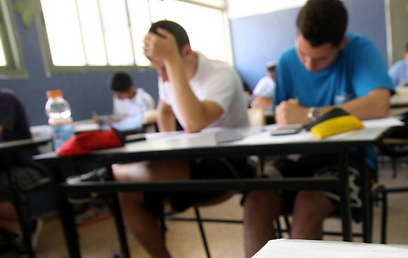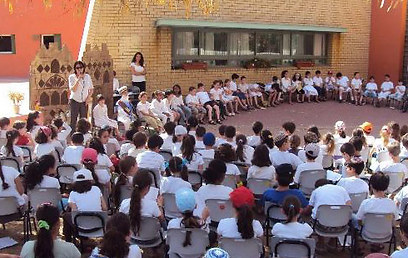
Starting next year, the Education Ministry will officially instate school programs that integrate secular and religious youth and children. Integrated schools and kindergartens will be subsidized and supervised by the government. Though it passed in 2008, the Integrated Education Act will only be implemented in the Israeli school system next year.
Praying together
Independent schools that incorporate religious and secular studies have been operating nationwide for years, but without government funding or supervision.
Daniel Elazar, director of the Shalom Hartman Institute, a center for Jewish studies, says that in an integrated school in Jerusalem, "studying Jewish philosophy is at the heart of the school's doctrine, and most subjects are taught without a distinction between secular and religious students. As for learning about Judaism, parents and students can choose between two classes: one that focuses on orthodox aspects, and one that focuses on the perception of Judaism as a culture."
Prayer is also a matter of choice. In elementary schools, prayer "tends to be less formal, and can be adapted to fit all children, with additions and omissions," Elazar says. "In high schools," he adds, "parents and students can choose between traditional prayer, and discussion about the meaning of prayer."

Integrated class (Photo: Roee Idan)
Having encouraged his own children to attend integrated programs, Elazar believes it was an enlightening experience. "Israeli society is itself integrated, and I think my children should face it at an early age. Orthodox schools are afraid of children turning to secularism, but I think that realizing what Israeli society really is can make their beliefs stronger."
Elazar believes that even if someone changes his or her faith, attending an integrated program can be conducive to undergoing the process of turning to or from religion in a more moderate manner than without such a support system.
Teaching parents too
Ariel Yadin, chair of the Keshet Association – which works to bring secular and religious children and teens together – says that an integrated program in his town has both integrated and separated classes, in an attempt to instill both a sense of coherent identity in each child and a sense of solidarity and tolerance. "The goal is that no one feels like an outsider," Yadin explains. "When one is not secure in one's identity, a divide is created."But not everyone is convinced of the benefits of integration. Journalist Yair Sheleg's children went to an elementary school with an integrated education program, but chose to go to a religious school once they reached junior high.
According to Sheleg, he and his wife thought having their children in an integrated program "would help them assimilate in Israeli society, and – more substantially, make their belief more profound, especially in the face of conflict. "At the time, religious schools did not address Jewish philosophy, but rather focused on Halacha, which I believe is of course very important, but is incomplete if not accompanied by other Jewish values."

Integration in elementary school. Helps children 'assimilate in Israeli society'
But when Sheleg's children started junior high school, they preferred to go to a religious school, feeling that the divide between the secular culture – with its customs, dress code and activities – and their own religious traditions was too great.
According to Sheleg, other parents faced similar problems. Sheleg also believes that lenience is somewhat imposed on secular parents, who often find themselves surrendering to teen culture, though they would prefer their children to spend their time differently. "The advantage of religious parents," Sheleg states, "is their unwillingness to give in to teen fads."
Rabbi Michael Melchior, the man behind the Integrated Education Act, whose children all went to integrated programs, is nonetheless satisfied. "I'm certain that Integrated Education is one of the most important initiatives in Israel," he says. "With the help of Integrated Education, we may grow together as one society, by focusing on what is common rather than on what is different."
"I am pleased that the government is taking responsibility and that the Integrated Education Act will be launched next year as an official national program."















